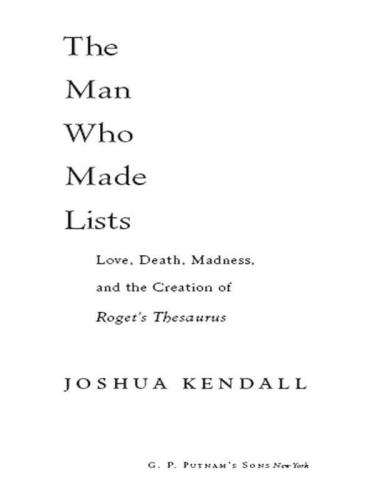
The Man Who Made Lists
Love, Death, Madness, and the Creation of Roget's Thesaurus
کتاب های مرتبط
- اطلاعات
- نقد و بررسی
- دیدگاه کاربران
نقد و بررسی

November 12, 2007
First published in London in 1852, Roget’s Thesaurus of English Words and Phrases
became popular in America with the 1920s crosswords craze and has sold almost 40 million copies worldwide. According to freelancer Kendall in this Professor and the Madman
wannabe, Peter Mark Roget (1779–1869) compiled the thesaurus as a means of staving off the madness that pervaded his family—the classification of words was a coping mechanism for his anxiety. Burdened by his father’s early death and a mentally unstable mother and grandmother, young Roget was shy and melancholy. In the wake of the suicide of his uncle and surrogate father, Samuel Romilly, a distinguished MP, Roget’s mother slid into paranoia, and a depressed Roget left a flourishing medical practice. But in his 40s, he found happiness: he married a wealthy, intellectually curious woman; developed a lively social circle; and became a first-rate scientist, lecturer and science writer for the masses. His thesaurus, which he tinkered with for nearly half a century, borrowed principles of classification from Roget’s hero, the naturalist Carl Linnaeus. Although Roget is a tantalizing subject, Kendall never lights the necessary spark to make the legendary wordsmith come alive. B&w illus.

December 15, 2007
How did a physician produce a masterpiece linguistic work? Journalist Kendall provides a very personal answer, namely, that Dr. Peter Roget originally pursued his thesaurus to benefit his own writing and stay mentally occupied despite numerous tragic deaths in his family. Thus, through making scholarly contributions, Roget also avoided the mental illness that plagued other relatives. Drawing upon letters, diaries, and other family documents, Kendall blends historical research with storytelling to support the theme of personal battles and educational experience. For example, Kendall begins by narrating how Roget discovered the suicide of his famous barrister uncle, Sir Samuel Romilly, citing this as one of many tragedies Roget endured. Kendall also discusses Roget's 15,000-word precursor (1805) to the 1852 thesaurus. The earlier part of Roget's 90 years is emphasized, including narrative and quotations to portray his family life, developing interest in language and science, and early efforts to categorize his learning. Another recent biography by Nick Rennison (Pocket Essentials, 2007) generally illumines Roget's scholarly background instead of the personal theme. Recommended for public and academic libraries.Marianne Orme, Des Plaines P.L., IL
Copyright 2007 Library Journal, LLC Used with permission.

December 15, 2007
Rogets Thesaurus of English Words and Phrases was first published in London in 1852 and has sold nearly 40 million copies since then. This book is a biography of Peter Mark Roget, the nineteenth-century physician, physiology expert, mathematician, inventor, writer, editor, and chess whiz. Kendall sees that Roget was obsessed with words ever since he began studying Latin as a schoolboy and that he completed a first draft of the Thesaurusthe Latin word for treasure or treasuryin 1805, when he was 26. However, it was not until his retirement in 1848 that Roget finished the Thesaurus. He died at the age of 90, having watched over the publication of 28 editions.(Reprinted with permission of Booklist, copyright 2007, American Library Association.)

























دیدگاه کاربران